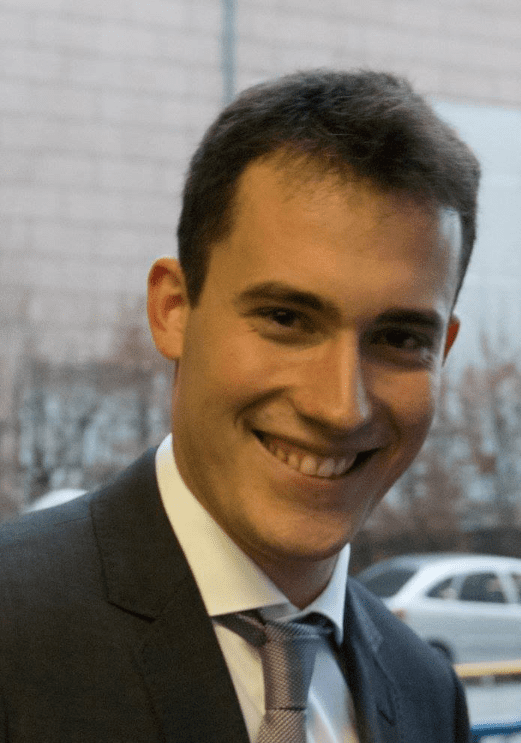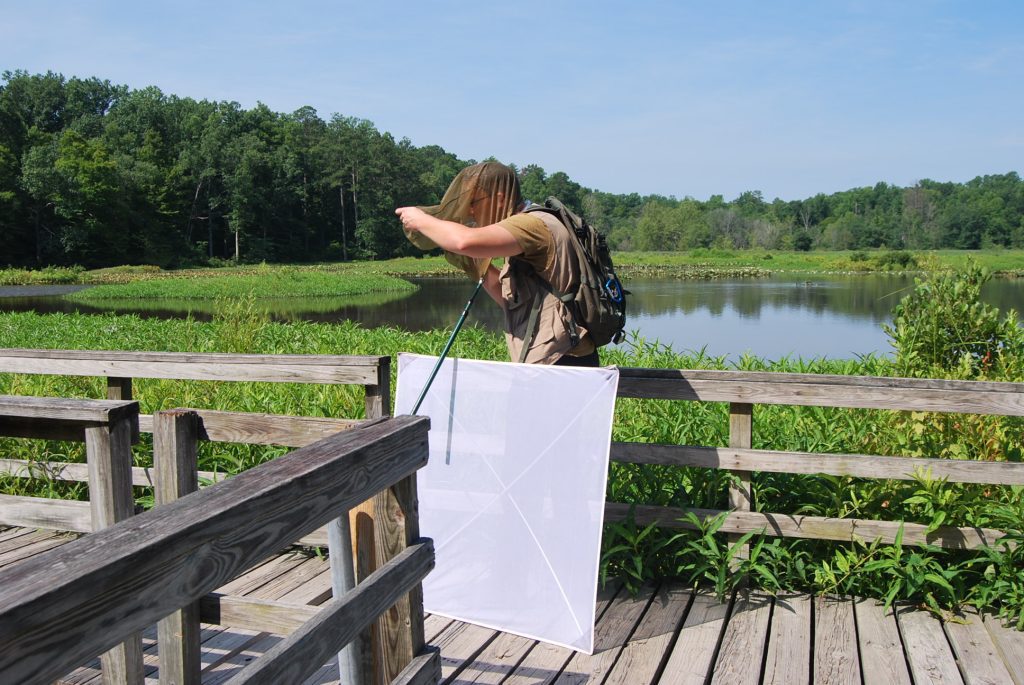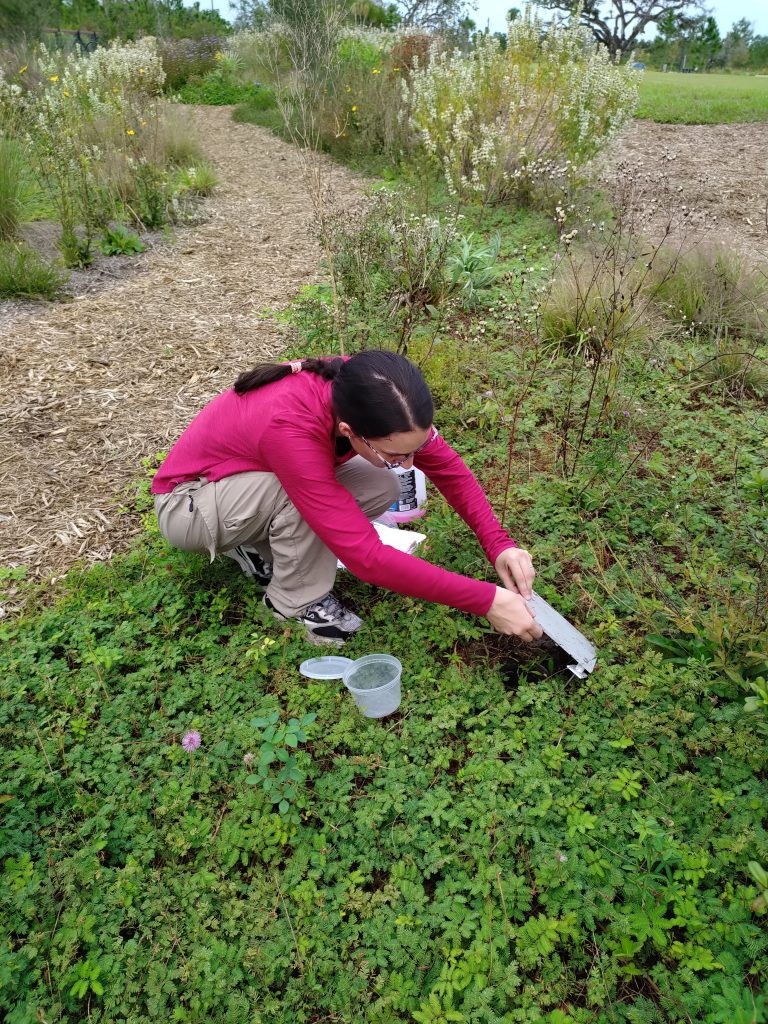Biology Ph.D. Students Awarded at the Entomological Society of America Annual Meeting
Integrative and Conservation Biology Ph.D. candidates Davide Dal Pos and Alessandra Pandolfi were honored with awards at the Entomological Society of America Annual Meeting in Maryland. Dal Pos earned the first place award in the Systematics, Evolution and Biodiversity (SysEB): Morphology 2 section for his presentation titled, “A revised terminology for male genitalia in Hymenoptera (Insecta), with a special emphasis on Ichneumonoidea.” Pandolfi earned the first place award in the Systematics, Evolution and Biodiversity (SysEB): Conservation section for her presentation titled: “Promoting ground-dwelling insects through sustainable practices in suburban landscapes.”
We spoke with Dal Pos and Pandolfi to learn more about their research and recent awards.
Davide Dal Pos

How did you feel when you found out that you won the award?
I was extremely excited and proud. Coming from a different country in which English is not the native language and ending up winning one of the most prestigious awards for students in the USA, it felt like a dream came true. It wasn’t merely about the award; rather, it was the gratification that my presentation not only showcased well-constructed content but also captivated the audience to the extent of securing the top position.
Why did you choose your field of study?
Insects account for 80 percent of animal life on Earth. The prominent entomologist and writer, Edward O. Wilson, once said that insects are “the little things that run the world” and in fact, their impact in the natural world and in human society is impressive.
Despite their importance, most insect species remain undiscovered, and their behaviors and adaptations are, for the most part, still undescribed. Therefore, the thrill for the unknown and the push for exploration is what led me to become an entomologist. It is so exciting looking at an insect under the microscope and marveling at the intricacies sculpted by millions of years of natural selection. The experience of uncovering the mysteries held within the minute details of these creatures is, for me, unparalleled.

Please share more about your research project. What is the desired outcome of the research?
I am an evolutionary morphologist, comparative anatomist and taxonomist, studying the parasitoid wasps in the family Ichneumonidae. My current Ph.D. project focuses on uncovering what morphological traits have evolved together in response to the same environmental pressure. On top of that, in my free time, I am also working to become a prominent taxonomist. Currently, I have published several contributions on the subject describing multiple species new to science.
All these are important questions and activities foundational to every other science in the realm of biology. An essential prerequisite for our collective progress as a species lies in our comprehension of the natural world. I strongly believe that the current epoch is defined by the prominence of biology, with a particular emphasis on phenomics.
Alessandra Pandolfi

How did you feel when you found out that you won the award?
I experienced a sense of surprise and gratitude. Coming from a different country (I was born and raised in Italy), this recognition holds significant personal and professional meaning. Winning the award goes beyond acknowledging the merits of my research. It testifies to the journey I’ve undertaken and the growth I’ve experienced as an individual over the years.
The acknowledgment of my work not only validates the importance of the research itself but also highlights the significance of diverse perspectives in contributing to the scientific community. I am immensely grateful to my supervisor for all the support he has given to me and to this country for the opportunities and the enriching experiences it continues to offer.
Why did you choose your field of study?
From an early age, I have always had passion for the natural sciences. My intention was to acquire academic and technical expertise with significant implications for conservation endeavors particularly in the face of challenges posed by human impact on natural habitats. My aspiration is to make meaningful contributions to the scientific understanding of these critical issues and develop practical conservation strategies.

Please share more about your research project. What is the desired outcome of the research?
I am in the urban ecology lab under Dr. Patrick Bohlen, and I study how urbanization influences insect diversity, with emphasis on beetles. Beetles play an essential functional role in the ecosystems, and they are highly sensitive to urbanization, experiencing decline in both richness and abundance.1
My research is centered on investigating the trait-based responses of beetles to human-induced land use changes, including urban development, fragmentation and management actions at the city park level. I also work on a multi-disciplinary project examining the benefits of sustainable landscape practices in new residential areas in Florida.
The ultimate goal is to advocate for data-driven decision-making and the widespread adoption of alternative landscapes across the state. Collaboration is the heart of this effort, and it bridges the private and public sectors, academia, and industry and is essential for developing effective long-lasting solutions and promoting conservation.
- Fenoglio, M.S., Rossetti, M.R. and Videla, M., 2020. Negative effects of urbanization on terrestrial arthropod communities: A meta‐analysis. Global Ecology and Biogeography, 29(8), pp.1412-1429.
Learn more about the Integrative and Conservation Biology Ph.D. program.
